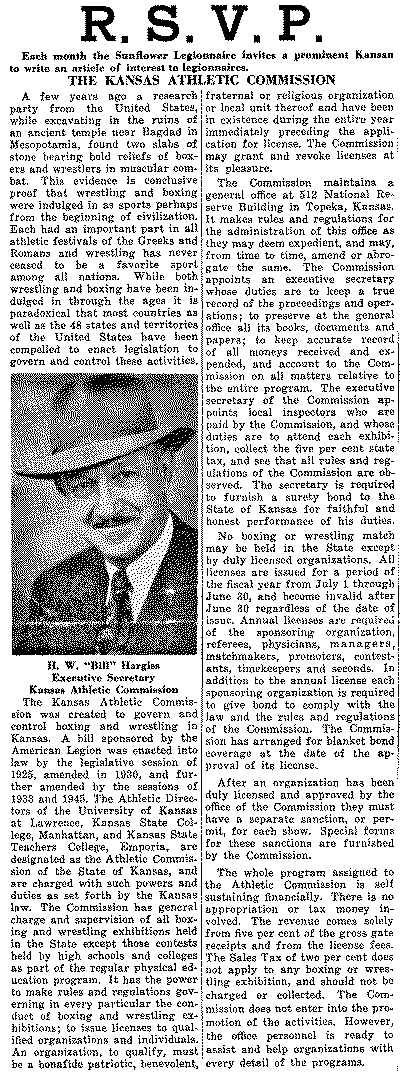|
|
Each month the Sunflower Legionnaire
invites a prominent Kansan to write an article of interest to legionnaires.

THE KANSAS ATHLETIC COMMISSION
A few years ago a research party from the United States, while excavating in the
ruins of an ancient temple near Baghdad in Mesopotamia, found two slabs of stone
bearing bold reliefs of boxers and wrestlers in muscular combat. This evidence is
conclusive proof that wrestling and boxing were indulged in as sports perhaps from
the beginning of civilization. Each had an important part in all athletic festivals
of the Greeks and Romans and wrestling has never ceased to be a favorite sport among
all nations. While both wrestling and boxing have been indulged in through the ages
it is paradoxical that most countries as well as the 48 states and territories of
the United States have been compelled to enact legislation to govern and control
these activities.
The Kansas Athletic Commission was created to govern and
control boxing and wrestling in Kansas. A bill sponsored by the American Legion
was enacted into law by the legislative session of 1925, amended in 1930, and further
amended by the sessions of 1933 and 1945. The Athletic Directors of the University
of Kansas at Lawrence, Kansas State College, Manhattan, and Kansas State Teachers
College, Emporia, are designated as the Athletic Commission of the State of Kansas,
and are charged with such powers and duties as set forth by the Kansas law. The
Commission has general charge and supervision of all boxing and wrestling exhibitions
held in the State except those contests held by high schools and colleges as part
of the regular physical education program. It has the power to make rules and regulations
governing in every particular the conduct of boxing and wrestling exhibitions; to
issue licenses to qualified organizations and individuals. An organization, to qualify,
must be a bonafide patriotic, benevolent,
fraternal or religious organization or local unit thereof and have been in existence
during the entire year immediately preceding the application for license. The Commission
may grant and revoke licenses at its pleasure.
The Commission maintains a general office at 512 National
Reserve Building in Topeka, Kansas. It makes rules and regulations for the administration
of this office as they may deem expedient, and may, from time to time, amend or
abrogate the same. The Commission appoints an executive secretary whose duties are
to keep a true record of the proceedings and operations; to preserve at the general
office all its books, documents and, papers; to keep accurate record' of all moneys
received and expended, and account to the Commission on all matters relative to
the entire program. The executive secretary of the Commission appoints local inspectors
who are paid by the Commission, and whose duties are to attend each exhibition,
collect the five per cent state tax, and see that all rules and regulations of the
Commission are observed. The secretary is required to furnish a surety bond to the
State of Kansas for faithful and honest performance of his duties.
No boxing or wrestling match may be held in the State except!
by duly licensed organizations. All licenses are issued for a period of the fiscal
year from July 1 through June 30, and become invalid after June 30 regardless of
the date of issue. Annual licenses are required of the sponsoring organization,
referees, physicians, managers, matchmakers, promoters, contestants, timekeepers
and seconds. In addition to the annual license each sponsoring organization is required
to give bond to comply with the law and the rules and regulations of the Commission.
The Commission has arranged for blanket bond coverage at the date of the approval
of its license.
After an organization has been' duly licensed and approved
by the office of the Commission they must have a separate sanction, or permit, for
each show. Special forms for these sanctions are furnished by the Commission.
The whole program assigned to the Athletic Commission is
self sustaining financially. There is no appropriation or tax money involved. The
revenue comes solely from five per cent of the gross gate receipts and from the
license fees. The Sales Tax of two per cent does not apply to any boxing or wrestling
exhibition; and should not be charged or collected. The Commission does not enter
into the promotion of the activities. However, the office personnel is ready to
assist and help organizations with every detail of the programs.